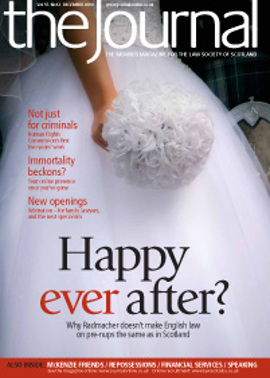Save our system

A 10% cut in civil fees across the board. Large areas, including nearly all divorce and most family law, removed from legal aid altogether. At least half a million fewer cases qualifying for legal aid each year. The total budget, already capped for the last five years, to be slashed by a sixth (16.67%). Those are the legal aid proposals for England & Wales on which Justice Secretary Kenneth Clarke is now consulting following the UK Government’s spending review.
How did Scotland fare by comparison? The 8% legal aid budget cut – where it will bite has still to be decided – announced on 17 November by Cabinet Secretary John Swinney looks modest beside the Clarke measures, but it is accepted that it means more than just efficiency savings. Leading the line for the Society in trying to work out the detail, together with the Scottish Government and the Scottish Legal Aid Board (SLAB), is Legal Aid Convener Oliver Adair.
Adair, who reckons that since the implications of the Cadder case began to unfold in early summer he has probably spent half his working time dealing with the resulting legal aid changes or with budget issues, spoke at last month’s Legal Aid Conference of a developing “perfect storm” for legal aid practitioners, enveloping both financial and work/lifestyle issues.
“I’m on the record as saying it’s naïve to think the legal aid budget can avoid scrutiny when every other budget is under scrutiny”, he says. “And we have to be realistic also that it’s important to understand that this is different from normal negotiating situations the Society has seen in the past where we were trying to improve the funding arrangements for the profession and explaining the underlying assumptions for our position. This time the situation is due to economic matters outwith our control. We’re in an age of austerity. Cuts have to be made. The choice effectively the Society is placed in is to walk away and say, we don’t agree with the cuts, go ahead without us, or to have a seat at the table, and in the interests of both the profession and the public to protect access to justice issues, the core areas that are funded, so that practitioners can afford to provide a service to those who can’t afford it themselves.
“I think, and the Society thinks, it’s the correct decision to be involved in the process and influence it as best we can rather than not be at the table. Clearly there will be difficult decisions and discussions to be had, but my view, and I’m pleased that it’s the view of the office bearers, is that it’s better to be involved.” And better, he suggests, than the outcome in England of “just taking a chunk off everybody”.
It’s too early, he adds, to say what the main effects will be. Prior to the budget announcement, general discussions were taking place on areas of potential savings; these will now have to be costed to see what each can achieve.
Show us the figures
Has the Society been able to get its voice heard to prevent a worse outcome? “I don’t think it would be fair to say that the Society has had any level of control over the level of the budget cut; that’s entirely a matter for Government. What we have been able to get from the Justice Secretary is that he said he would value our input as to how that level of cuts can be achieved. In other words if we can identify areas where we think the system can be streamlined, rationalised or even changed in the way we deliver the service that will help to achieve that level of cuts, he will value our input, in the same way as he will if we say there are certain core areas where change would mean a detriment to the profession and the public.”
One thing Mr MacAskill has already promised is a greater role for the Public Defence Solicitors Office (PDSO). Immediately after the spending announcement the President, Jamie Millar, said there were “still serious questions about how such an expansion would work and the savings it would generate”. Adair promises to consult with the profession once the detail emerges, on whether solicitors think the proposals practicable and manageable. PDSO costs have to date been shielded from public gaze, but Adair expects that to change now that the stakes have been raised.
“Clearly we assume there has been work in Government circles to identify the areas they think savings can be made by expanding the PDSO. We assume there have to be figures attached to that discussion document and we’ll be asking, given that that matter is now in the public domain, if they will share that document with us and if they do, we will give it careful examination to see if the figures match up. If they do, and there are savings to be made in that regard, we are prepared to be open minded and discuss that with them.”
Inclusive debate
This interview took place just after the Scottish spending review announcement, and the first meeting to work on the detail was scheduled for the same evening. Adair explains that there is a window of opportunity until early next year. “The timescale we have been given to make the savings identified for 2011-12 is that if changes have to be put through by regulations, these have to be laid no later than February, so we have a window of opportunity by early new year to have these discussions and that’s the window we’re now moving into.”
He wants this to be an inclusive process. “One of the things I’m keen to stress that it isn’t just Oliver Adair’s teams’ ideas that we are taking to Government. If solicitors have ideas of their own that would assist, they should send them in, through the Journal or direct to the Society.”
Headlines have been generated recently by the Access to Justice Committee’s radical proposals to slash SLAB admin costs by having many of their functions carried out in other ways. (The committee’s remit is to look at broad ranging issues of access to justice while the legal aid teams deal with the “nuts and bolts” of the regulations, and their impact.) November’s Council meeting focused on the need to co-ordinate comment by Society committees rather than the merits of the proposals, but views were expressed that one outcome from such a scheme would be a franchising model such as is evolving in England. However, there is as yet no Council policy on the matter.
Meanwhile, Adair and his teams – he co-ordinates two negotiating teams, one on the civil side and one on the criminal – continue to direct their efforts to engaging with the Government and with SLAB, at a level of access which it appears is not enjoyed by their counterparts south of the border, even if it is time-intensive. “We have a hands-on Government”, Adair says. “The Cabinet Secretary as a former member of the profession is happy to engage in discussion. We don’t always agree, but he does have an open door approach, he and his officials, and as a result there are more meetings because we’re involved. Before devolution, decisions were made in London and passed on to us. I think that’s completely changed now.”
It is no secret that sections of the profession disagree with the Society’s negotiating stance, but Adair just laughs when I ask if he gets more grief from solicitors, or the Government, or SLAB. “I wouldn’t like to think that I only get grief from any of them, I don’t think that’s fair! We have disagreements with the Government at times, with SLAB at times and with our members at times. Some of the profession agree with what I do and some don’t. That is part and parcel of being in any representative body. I don’t have a problem with that. I don’t have any difficulty with people disagreeing with me, provided the disagreements are conducted in a healthy, reasonable and professional manner. Where we can agree, we agree. Where we disagree, we agree to disagree. That’s the way of negotiation and that’s the way of representation in my view.”
In this issue
- Guidance on evidential requirements for salmon fishing titles
- The problem of drug misuse: the Portuguese alternative
- Winter wondering
- Targeting best value
- Wedded to the pact?
- Human = people
- Fee changes in New Year
- Choosing friends
- Digital death
- Evolution or revolution?
- Agreeing to disagree
- Commercial sense
- Justice: the election target
- Law reform update
- Roadshows bring in hundreds
- Save our system
- Gill moves a step closer
- Member benefits grow
- Ask Ash
- Social media - Trojan horse?
- Speaking legally
- Setting your priorities
- Problems of definition
- A fishy business
- Creating a jigsaw
- One size fits all?
- Scottish Solicitors' Discipline Tribunal
- Website review
- Book reviews
- Climate change, culture change
- Default position
- Contaminated land guidance revised
- New and improved






